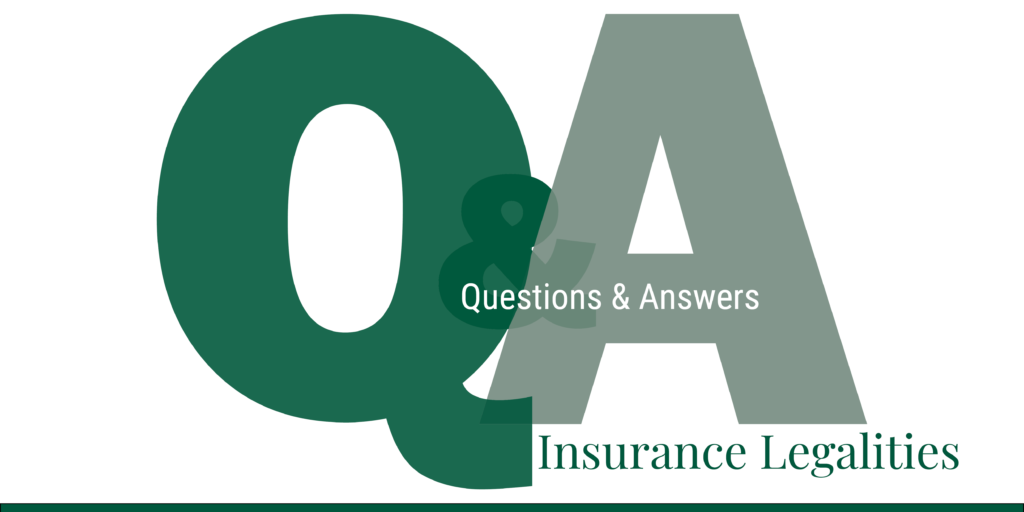
Insurance Legalities | Your questions answered
Q 1: In the case of a partnership entity named “Brian Johnson and John Johnson”, is it ok to express the partnership entity name as “Brian and John Johnson”?
A: When naming a partnership, it is always best to show “Brian Johnson and John Johnson” as in the example provided in the presentation as it will ensure that each individual member named will be covered in the event of an individual claim being made against them.
Q 2: Why can’t the insured be defined as including the Trustee in the policy wording?
A: The legal entity is the entity that needs to be named as the Insured as a writ will only ever be issued against the legal entity and not the Trust. A Trust is not a legal entity and can’t be sued therefore does not need to be named as an insured under the policy.
Q 3: Without the Trustee, is that leaving the other beneficiaries at risk?
A: All writs will be issued against the legal entity not the Trust. The service or product provided will be provided by the legal entity and not the Trust therefore as long as the legal entity is named as the insured the policy will respond. The third party has no legal connection to the beneficiaries therefore should not be able to sue the beneficiaries.
Q 4: Can a writ include security for damages against the assets of a trust? If the trustee is named as the insured entity (excluding the trust name), could the trust assets be uninsured and at risk?
A: A Trust is not a legal entity therefore it’s not capable of being sued. A Trust does not hold assets nor does it incur liabilities. Only a legal entity can own assets and incur liabilities.
Q 5: What is the cost of run-off coverage?
A: Run-off coverage can be purchased in two different ways (either on a per-year basis or on an aggregate basis) with the latter tending to be more cost-effective for the client as they are buying multiple years at once. Different rates apply to different insurers. Speak to your underwriter if you are curious about the cost of run-off pricing. As Matt stated in the presentation, you should always recommend your client take additional run-off periods. It may be prudent to continue purchasing run-off depending on the risk and industry claims trends. Also please refer to Q6 regarding the statute of limitations.
Q 6: With respect to a PI claim being brought from an incident in the past, does the statute of limitations not afford an insured any protection? If so… why buy PI to cover works done more than 6 years ago?
A: The statute of limitations does afford some protection to entities and is a different time frame depending on the jurisdiction and subject matter. The issue is that the statute of limitations only commences once the party that has suffered a loss discovers that they have suffered a loss. If the third party does not discover they have suffered a loss for many years after the advice was given then the statute clock on starts ticking once the third party discovers they have suffered a loss. Run-off cover requirements should always be reviewed with the client even after their X number of years of run-off has expired. As in Matt’s example provided, the engineer was still deemed responsible for the balcony height being non-conforming to the building code decades after he designed it.
Q 7: Runoff cover – if the entity is wound up how can someone make a claim against the “vacant space” that the entity used to occupy?
A: If a company has been deregistered, it ceases to exist as a legal entity and any claims made against it would have to end. It is possible that the claimant could push a court to reinstate the entity however there would need to be a convincing case as generally a business cannot just deregister when things are going wrong. They have to meet a number of conditions in order to do so and it is usually a last resort. Also, if the entity is no longer registered then the individual who provided the product or service may be personally liable.
Q 8: Wouldn’t the new owner take on the liability of the business they’ve purchased?
A: Not necessarily. In fact, most purchasers of private companies don’t take on the liabilities of the past owners. Most new owners don’t want to take on a potential liability that was incurred prior to their ownership.
Q 9: Would an insurer provide standalone product liability terms?
A: It would not be advisable to take only Products liability without the Public Liability component.
Q 10: We are seeing more bodily injury claims falling under PI policies. The following claims example is an example of where a bodily injury claim fell under the client’s (a property manager) PI policy and not their PL policy.
A: A house fire caused a young child to suffer burns resulting in her death. Five family members brought BI claims against the insured who was the property manager of the property. The insured faced exposure as the property managers after a strong causation that a defunct fire alarm could have prevented the loss had it been working properly. The insured had become aware of the dysfunction during an inspection one month prior to the fire and it was accepted that the property manager assumed responsibility to inform the tenants upon becoming aware of its dysfunction. The insured had $1m PI coverage for their professional activities and the claim fell under their PI coverage given that the claim had arisen as a result of their professional negligence. Given the extent of the claims against them, the insured faced a significant risk of up to $2m meaning that they were grossly underinsured. Following the settlement, the insured faced significant out-of-pocket costs.
Q 11: If a business has been sold, does the new owner have to purchase their insurance from the same insurance company as the old owner?
A: Not necessarily, but the previous insurance company may offer a more competitive premium as they
already know the business.
Related Links
Quote and Bind a Policy Instantly
Still have questions? Talk to one of our friendly underwriters!
Presenting a Risk to an Underwriter
Important Notice
Berkley Insurance Company (limited company incorporated in Delaware, USA) ABN 53 126 559 706 t/as Berkley Insurance Australia is an APRA authorised general insurer. Information provided is general only, intended for brokers and has been prepared without taking into account any person’s particular objectives, financial situation or needs. Insurance cover is subject to terms, conditions, limits, and exclusions. When making a decision to buy or continue to hold a product, you should review the relevant policy documents.
Share this post on
Supporting Communities: Berkley Insurance Australia Highlights 2025 Grants Program
Making Every Bind Count: Our 2026 Partnership with Two Good Co


